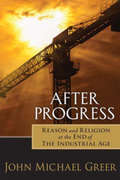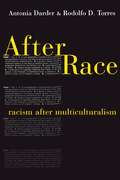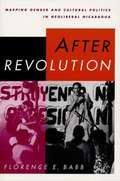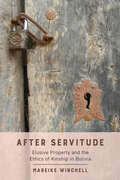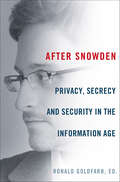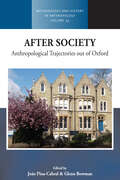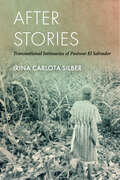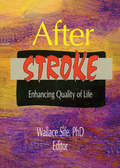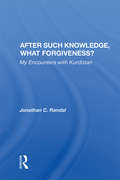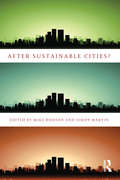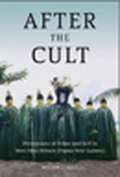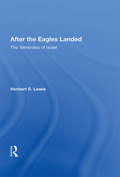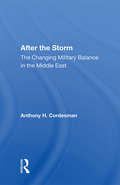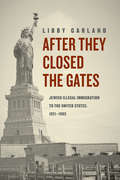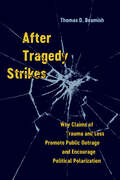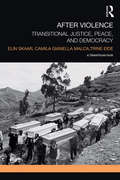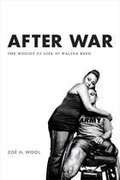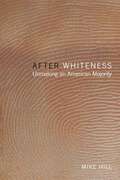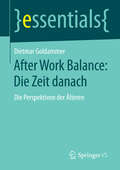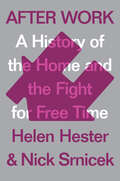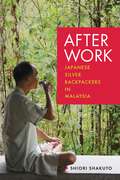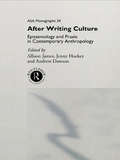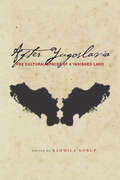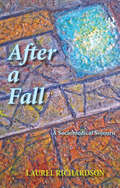- Table View
- List View
After Progress: Reason and Religion at the End of the Industrial Age
by John Michael GreerThe acclaimed climate futurist examines our unquestioning faith in progress, and its limits in the face of peak oil and climate change. Since the Industrial Age began, scientific and technological progress has been nothing short of miraculous. As a result, progress itself has become the new religion of the West. Our faith in it is so complete that many of us ignore the perils of peak oil and climate change, believing that our lab-coated high priests will surely bring forth yet another miracle to save us all. Unfortunately, progress as we've known it has been entirely dependent on the breakneck exploitation of half a billion years of stored sunlight in the form of fossil fuels. As the age of this cheap, abundant energy draws to a close, progress is grinding to a halt. Unforgiving planetary limits are teaching us that our blind faith in endless exponential growth is a dangerous myth.After Progress addresses this looming paradigm shift, exploring the shape of history from a perspective on the far side of the coming crisis. With a startling examination of the role our belief systems play in our collective fate, John Michael Greer makes a persuasive argument for seeking new sources of meaning, value, and hope for the era ahead.
After Race: Racism After Multiculturalism
by Rodolfo D. Torres Antonia DarderAfter Race pushes us beyond the old "race vs. class" debates to delve deeper into the structural conditions that spawn racism. Darder and Torres place the study of racism forthrightly within the context of contemporary capitalism. While agreeing with those who have argued that the concept of "race" does not have biological validity, they go further to insist that the concept also holds little political, symbolic, or descriptive value when employed in social science and policy research.Darder and Torres argue for the need to jettison the concept of "race," while calling adamantly for the critical study of racism. They maintain that an understanding of structural class inequality is fundamentally germane to comprehending the growing significance of racism in capitalist America.
After Revolution: Mapping Gender and Cultural Politics in Neoliberal Nicaragua
by Babb Florence E.Nicaragua's Sandinista revolution (1979-1990) initiated a broad program of social transformation to improve the situation of the working class and poor, women, and other non-elite groups through agrarian reform, restructured urban employment, and wide access to health care, education, and social services. This book explores how Nicaragua's least powerful citizens have fared in the years since the Sandinista revolution, as neoliberal governments have rolled back these state-supported reforms and introduced measures to promote the development of a market-driven economy. Drawing on ethnographic research conducted throughout the 1990s, Florence Babb describes the negative consequences that have followed the return to a capitalist path, especially for women and low-income citizens. In addition, she charts the growth of women's and other social movements (neighborhood, lesbian and gay, indigenous, youth, peace, and environmental) that have taken advantage of new openings for political mobilization. Her ethnographic portraits of a low-income barrio and of women's craft cooperatives powerfully link local, cultural responses to national and global processes.
After Servitude: Elusive Property and the Ethics of Kinship in Bolivia
by Dr. Mareike WinchellHow are injurious pasts redeployed by the dispossessed? After Servitude explores how agrarian engineers, Indigenous farmers, Mestizo mining bosses, and rural workers navigate racial hierarchies rooted in histories of forced agrarian labor. In the rural Bolivian province of Ayopaya, where the liberatory promises of property remain elusive, Quechua people address such hierarchies by demanding aid from Mestizo elites and, when that fails, through acts of labor militancy. Against institutional faith in property ownership as a means to detach land from people and present from past, the kin of former masters and servants alike have insisted that ethical debts from earlier racial violence stretch across epochs and formal land sales. What emerges is a vision of justice grounded in popular demands that wealth remain beholden to the region’s agrarian past. By tracing Ayopayans’ active efforts to contend with servitude’s long shadow, Mareike Winchell illuminates the challenges that property confronts as both an extractive paradigm and a means of historical redress.
After Sex?: On Writing Since Queer Theory
by Janet Halley Andrew ParkerSince queer theory originated in the early 1990s, its insights and modes of analysis have been taken up by scholars across the humanities and social sciences. In After Sex? prominent contributors to the development of queer studies offer personal reflections on the field's history, accomplishments, potential, and limitations. They consider the purpose of queer theory and the extent to which it is or is not defined by its engagement with sex and sexuality. For many of the contributors, a broad notion of sexuality is essential to queer thought. At the same time, some of them caution against creating an all-embracing idea of queerness, because it empties the term "queer" of meaning and assumes the universality of ideas developed in the North American academy. Some essays recall the political urgency of the late 1980s and early 1990s, when gay and lesbian activist and queer theory projects converged in response to the AIDS crisis. Other pieces exemplify more recent trends in queer critique, including the turn to affect and the debates surrounding the "antisocial thesis," which associates queerness with the repudiation of heteronormative forms of belonging. Contributors discuss queer theory's engagement with questions of transnationality and globalization, temporality and historical periodization. Meditating on the past and present of queer studies, After Sex? illuminates its future. Contributors. Lauren Berlant, Leo Bersani, Michael Cobb, Ann Cvetkovich, Lee Edelman, Richard Thompson Ford, Carla Freccero, Elizabeth Freeman, Jonathan Goldberg, Janet Halley, Neville Hoad, Joseph Litvak, Heather Love, Michael Lucey, Michael Moon, Jos Esteban Muoz, Jeff Nunokawa, Andrew Parker, Elizabeth A. Povinelli, Richard Rambuss, Erica Rand, Bethany Schneider, Eve Kosofsky Sedgwick, Kate Thomas
After Snowden: Privacy, Secrecy and Security in the Information Age
by Ronald GoldfarbWas Edward Snowden a patriot or a traitor? Just how far do American privacy rights extend?And how far is too far when it comes to government secrecy in the name of security? These are just a few of the questions that have dominated American consciousness since Edward Snowden exposed the breath of the NSA's domestic surveillance program. In these seven previously unpublished essays, a group of prominent legal and political experts delve in to life After Snowden, examining the ramifications of the infamous leak from multiple angles: • Washington lawyer and literary agent RONALD GOLDFARB acts as the book's editor and provides an introduction outlining the many debates sparked by the Snowden leaks.• Pulitzer Prize winning journalist BARRY SIEGEL analyses the role of the state secrets provision in the judicial system.• Former Assistant Secretary of State HODDING CARTER explores whether the press is justified in unearthing and publishing classified information. • Ethics expert and dean of the UC Berkley School of Journalism EDWARD WASSERMAN discusses the uneven relationship between journalists and whistleblowers.• Georgetown Law Professor DAVID COLE addresses the motives and complicated legacy of Snowden and other leakers.• Director of the National Security Archive THOMAS BLANTON looks at the impact of the Snowden leaks on the classification of government documents.• Dean of the University of Florida Law School JON MILLS addresses the constitutional right to privacy and the difficulties of applying it in the digital age.
After Society: Anthropological Trajectories out of Oxford (Methodology & History in Anthropology #39)
by Glenn Bowman João Pina-CabralIn the early 1980s, when the contributors to this volume completed their graduate training at Oxford, the conditions of practice in anthropology were undergoing profound change. Professionally, the immediate postcolonial period was over and neoliberal reforms were marginalizing the social sciences. Analytically, the poststructuralist critique of the notion of ‘society’ challenged a discipline that dubbed itself as ‘social’. Here self-ethnography is used to portray the contributors’ anthropological trajectories, showing how analytical and academic engagements interacted creatively over time.
After Stories: Transnational Intimacies of Postwar El Salvador
by Irina Carlota SilberThis book builds upon Irina Carlota [Lotti] Silber's nearly 25 years of ethnographic research centered in Chalatenango, El Salvador, to follow the trajectories—geographic, temporal, storied—of several extended Salvadoran families. Traveling back and forth in time and across borders, Silber narrates the everyday unfolding of diasporic lives rich with acts of labor, love, and renewed calls for memory, truth, and accountability in El Salvador's long postwar. Through a retrospective and intimate ethnographic method that examines archives of memories and troubles the categories that have come to stand for "El Salvador" such as alarming violent numbers, Silber considers the lives of young Salvadorans who were brought up in an everyday radical politics and then migrated to the United States after more than a decade of peace and democracy. She reflects on this generation of migrants—the 1.5 insurgent generation born to forgotten former rank-and-file militants—as well as their intergenerational, transnational families to unpack the assumptions and typical ways of knowing in postwar ethnography. As the 1.5 generation sustains their radical political project across borders, circulates the products of their migrant labor through remittances, and engages in collective social care for the debilitated bodies of their loved ones, they transform and depart from expectations of the wounded postwar that offer us hope for the making of more just global futures.
After Stroke: Enhancing Quality of Life
by Wallace SifeAfter Stroke: Enhancing Quality of Life brings together an extraordinary selection of advice, practical survivor techniques, information about resources, and personal stories of triumph. It is designed to help those who have experienced a stroke attain the highest quality of life possible, under their new physical restrictions.Recuperating from a stroke is an arduous process that has only just begun when the survivor is released from the hospital. This book shows anyone interested how to create an effective climate for healing and how to help the survivor realize his/her fullest recovery potential. It offers varied perspectives of everyone involved with a stroke: the patient, the family, and friends as well as the team of specialized physicians, nurses, psychologists, physical therapists, speech pathologists, and diverse therapists.Through its interesting and varied essays, After Stroke: Enhancing the Quality of Life offers the reader a clearer understanding of the injuries that the body as well as the mind have sustained. This anthology is carefully designed to present enhanced perspectives into all aspects of the healing and recovery processes that follow the personal tragedy of a stroke.
After Such Knowledge, What Forgiveness?: My Encounters With Kurdistan
by Jonathan C. RandalThis book is about the Kurds and Kurdistan, discussing Kurdish nationalist aspirations, the repeated Kurdish revolts, and the rogue chromosome in Kurdish genetics causes what Indians, with their love of fancy words, would call "fissiparous tendencies."
After Sustainable Cities?
by Simon Marvin Mike HodsonA sustainable city has been defined in many ways. Yet, the most common understanding is a vision of the city that is able to meet the needs of the present without compromising the ability of future generations to meet their own needs. Central to this vision are two ideas: cities should meet social needs, especially of the poor, and not exceed the ability of the global environment to meet needs.After Sustainable Cities critically reviews what has happened to these priorities and asks whether these social commitments have been abandoned in a period of austerity governance and climate change and replaced by a darker and unfair city. This book provides the first comprehensive and comparative analysis of the new eco-logics reshaping conventional sustainable cities discourse and environmental priorities of cities in both the global north and south. The dominant discourse on sustainable cities, with a commitment to intergenerational equity, social justice and global responsibility, has come under increasing pressure. Under conditions of global ecological change, international financial and economic crisis and austerity governance new eco-logics are entering the urban sustainability lexicon – climate change, green growth, smart growth, resilience and vulnerability, ecological security. This book explores how these new eco-logics reshape our understanding of equity, justice and global responsibility, and how these more technologically and economically driven themes resonate and dissonate with conventional sustainable cities discourse. This book provides a warning that a more technologically driven and narrowly constructed economic agenda is driving ecological policy and weakening previous commitment to social justice and equity. After Sustainable Cities brings together leading researchers to provide a critical examination of these new logics and identity what sort of city is now emerging, as well as consider the longer-term implication on sustainable cities research and policy.
After The Cult
by Holger JebensIn many parts of the world the "white man" is perceived to be an instigator of globalization and an embodiment of modernity. However, so far anthropologists have paid little attention to the actual heterogeneity and complexity of "whiteness" in specific ethnographic contexts. This study examines cultural perceptions of other and self as expressed in cargo cults and masked dances in Papua New Guinea. Indigenous terms, images, and concepts are being contrasted with their western counterparts, the latter partly deriving from the publications and field notes of Charles Valentine. After having done his first fieldwork more than fifty years ago, this "anthropological ancestor" has now become part of the local tradition and has thus turned into a kind of mythical figure. Based on anthropological fieldwork as well as on archival studies, this book addresses the relation between western and indigenous perceptions of self and other, between "tradition" and "modernity," and between anthropological "ancestors" and "descendants." In this way the work contributes to the study of "whiteness," "cargo cults" and masked dances in Papua New Guinea.
After The Eagles Landed: The Yemenites Of Israel *now Available Thru Waveland Press *waveland Tel#-708-634-0081
by Herbert S. LewisThis book portrays aspects of the life of a community of over 1,200 Jews who were either born in Yemen, or who were, in 1975–77, the young sons and daughters of immigrants from Yemen. It contains implications for the important and currently debated topic of ethnic integration in Israel.
After The Storm: The Changing Military Balance In The Middle East (History And Politics In The 20th Century: Bloomsbury Academic Ser.)
by Anthony H CordesmanThis comprehensive new analysis goes far beyond today's headlines and the basic facts and figures on the military forces in the region. Tracing the origin of the military forces in each Middle East country, Tony Cordesman discusses current security developments and provides a qualitative and quantitative analysis of the strength and effectiveness o
After They Closed the Gates: Jewish Illegal Immigration to the United States, 1921-1965
by Libby GarlandIn 1921 and 1924, the United States passed laws to sharply reduce the influx of immigrants into the country. By allocating only small quotas to the nations of southern and eastern Europe, and banning almost all immigration from Asia, the new laws were supposed to stem the tide of foreigners considered especially inferior and dangerous. However, immigrants continued to come, sailing into the port of New York with fake passports, or from Cuba to Florida, hidden in the holds of boats loaded with contraband liquor. Jews, one of the main targets of the quota laws, figured prominently in the new international underworld of illegal immigration. However, they ultimately managed to escape permanent association with the identity of the OC illegal alienOCO in a way that other groups, such as Mexicans, thus far, have not. Ina"After They Closed the Gates, a"Libby Garland tells the untold stories of the Jewish migrants and smugglers involved in that underworld, showing how such stories contributed to growing national anxieties about illegal immigration. Garland also helps us understand how Jews were linked to, and then unlinked from, the specter of illegal immigration. By tracing this complex history, Garland offers compelling insights into the contingent nature of citizenship, belonging, and Americanness. "
After Tragedy Strikes: Why Claims of Trauma and Loss Promote Public Outrage and Encourage Political Polarization
by Thomas D. BeamishWhile trauma and loss can occur anywhere, most suffering is experienced as personal tragedy. Yet some tragedies transcend everyday life's sad but inevitable traumas to become notorious public events: de facto "public" tragedies. In these crises, suffering is made publicly visible and lamentable. Such tragedies are defined by public accusations, social blame, outpourings of grief and anger, spontaneous memorialization, and collective action. These, in turn, generate a comparable set of political reactions, including denial, denunciation, counterclaims, blame avoidance, and a competition to control memories of the event. Disasters and crises are no more or less common today than in the past, but public tragedies now seem ubiquitous. After Tragedy Strikes argues that they are now epochal—public tragedies have become the day's definitive social and political events. Thomas D. Beamish deftly explores this phenomenon by developing the historical context within which these events occur and the role that political elites, the media, and an emergent ideology of victimhood have played in cultivating their ascendence.
After Violence: Transitional Justice, Peace, and Democracy
by Elin Skaar Camila Gianella Malca Trine EideAfter Violence: Transitional Justice, Peace, and Democracy examines the effects of transitional justice on the development of peace and democracy. Anticipated contributions of transitional justice mechanisms are commonly stated in universal terms, with little regard for historically specific contexts. Yet a truth commission, for example, will not have the same function in a society torn by long-term civil war or genocide as in a society emerging from authoritarian repression. Addressing trials, reparations, truth commissions, and amnesties, the book systematically addresses the experiences of four very different contemporary transitional justice cases: post-authoritarian Uruguay and Peru and post-conflict Rwanda and Angola. Its analysis demonstrates that context is a crucial determinant of the impact of transitional justice processes, and identifies specific contextual obstacles and limitations to these processes. The book will be of much interest to scholars in the fields of transitional justice and peacebuilding, as well as students generally concerned with human rights and democratisation.
After War: The Weight of Life at Walter Reed
by Zoë H. WoolIn After War Zoë H. Wool explores how the American soldiers most severely injured in the Iraq and Afghanistan wars struggle to build some kind of ordinary life while recovering at Walter Reed Army Medical Center from grievous injuries like lost limbs and traumatic brain injury. Between 2007 and 2008, Wool spent time with many of these mostly male soldiers and their families and loved ones in an effort to understand what it's like to be blown up and then pulled toward an ideal and ordinary civilian life in a place where the possibilities of such a life are called into question. Contextualizing these soldiers within a broader political and moral framework, Wool considers the soldier body as a historically, politically, and morally laden national icon of normative masculinity. She shows how injury, disability, and the reality of soldiers' experiences and lives unsettle this icon and disrupt the all-too-common narrative of the heroic wounded veteran as the embodiment of patriotic self-sacrifice. For these soldiers, the uncanny ordinariness of seemingly extraordinary everyday circumstances and practices at Walter Reed create a reality that will never be normal.
After Whiteness: Unmaking an American Majority (Cultural Front #1)
by Mike HillView the Table of Contents.Read the Introduction. "Beautifully written and rigorously argued, After Whiteness is the most important theoretical statement on white racial formation since ‘whiteness studies' began its current academic sojourn. By reading debates about multiculturalism, ethnicity, and the desire for difference as part of the material practices of the U.S. university system, it engages questions of race, humanistic inquiry, intellectual labor, and the democratic function of critical thought. The result is a critically nuanced analysis that promises to solidify Mike Hill's reputation as one of the finest thinkers of his generation."-Robyn Wiegman, Duke University "Mike Hill's After Whiteness is an important, provocative and timely book."-Against the Current "A lucid, fiercely argued, brilliantly conceived, richly provocative work in an emergent and growing area of cultural studies. After Whiteness sets new directions in American literary and cultural studies, and will become a landmark in the field."-Sacvan Bercovitch, Harvard University"Americanists across the disciplines will find Hill's analysis insightful and brilliant. A must for any scholar who wishes to, in Ralph Ellison's words, ‘go to the territory.'"-Sharon Holland, University of Illinois at ChicagoAs each new census bears out, the rise of multiracialism in the United States will inevitably result in a white minority. In spite of the recent proliferation of academic studies and popular discourse on whiteness, however, there has been little discussion of the future: what comes after whiteness? On the brink of what many are now imagining as a post-white American future, it remains a matter of both popular and academic uncertainty as to what will emerge in its place.After Whiteness aims to address just that, exploring the remnants of white identity to ask how an emergent post-white national imaginary figure into public policy issues, into the habits of sexual intimacy, and into changes within public higher education. Through discussions of the 2000 census and debates over multiracial identity, the volatile psychic investments that white heterosexual men have in men of color-as illustrated by the Christian men's group the Promise Keepers and the neo-fascist organization the National Alliance-and the rise of identity studies and diversity within the contemporary public research university, Mike Hill surveys race among the ruins of white America. At this crucial moment, when white racial change has made its ambivalent cultural debut, Hill demonstrates that the prospect of an end to whiteness haunts progressive scholarship on race as much as it haunts the paranoid visions of racists.
After Work Balance: Die Perspektiven der Älteren (essentials)
by Dietmar GoldammerWir werden immer älter, und viele Menschen sind beim Eintritt in den Ruhestand noch fit und möchten eine Tätigkeit ausüben, die ihnen Freude bereitet und für andere Nutzen stiftet. Dietmar Goldammer klärt auf, regt an und mobilisiert. Unterschiedliche individuelle Voraussetzungen erfordern unterschiedliche Strategien für eine veränderte Lebenssituation der älteren Menschen, und der Autor informiert mit zahlreichen Beispielen darüber, wie andere diese Situation erfolgreich gelöst haben. Zuvor stellt er dar, wie man sich auf den Ruhestand vorbereiten kann, welche Möglichkeiten es gibt und worauf man achten sollte. Auf diese Weise wird deutlich, dass man auch nach der Pensionierung noch erstrebenswerte Ziele erreichen kann.
After Work: A History of the Home and the Fight for Free Time
by Helen Hester Nick SRNICEKA timely manifesto for a feminist post-work politicsDoes it ever feel like you have no free time? You come home after work and instead of finding a space of rest and relaxation, you&’re confronted by a pile of new tasks to complete – cooking, cleaning, looking after the kids, and so on.In this ground-breaking book, Helen Hester and Nick Srnicek lay out how unpaid work in our homes has come to take up an ever-increasing portion of our lives – how the vacuum of free time has been taken up by vacuuming. Examining the history of the home over the past century – from running water to white goods to smart homes – they show how repeated efforts to reduce the burden of this work have faced a variety of barriers, challenges, and reversals.Charting the trajectory of our domestic spaces over the past century, Hester and Srnicek consider new possibilities for the future, uncovering the abandoned ideas of anti-housework visionaries and sketching out a path towards real free time for all, where everyone is at liberty to pursue their passions, or do nothing at all. It will require rethinking our living arrangements, our expectations and our cities.
After Work: Japanese Silver Backpackers in Malaysia
by Shiori ShakutoAn ethnography of “silver backpackers” that offers a feminist perspective on what makes a good retirement in contemporary societiesThe moniker “silver backpackers” refers to Japanese couples who, in their mid-fifties to seventies, move to Malaysia to enjoy their retirement. Recent scholarship on Japan has revealed how the gendered division of labor impacts the lives of middle-class workers and their families. But how do cultural values live on—or change—when these professionals retire from work, move on from identities built through salaried careers, and embark on a new phase of life? After Work takes up this question to focus on what comes after work, and in the process, expands our understanding of aging, gender, migration, and the future of work.Based on fifteen months of fieldwork in Kuala Lumpur and employing a transnational feminist framework, After Work investigates moments of difference in the experiences of older women and men to examine patriarchal conversations that dominate ideas about contemporary retirement. Shiori Shakuto argues that anxiety around self and belonging in retirement are instigated by the capitalist labor regime and the discourse of successful aging, both of which devalue nonremunerated activities conducted at home. What is needed instead, she contends, is a re-valuation of key domestic activities—from caring for children to pursuing individual hobbies—so that “life” can be appreciated in its entirety.Shakuto also takes into account the fact that this transnational retirement is set in Malaysia—a nation that Japan occupied during World War II and thereafter subject to decades of economic investment and resource exploitation by Japanese corporations. Highlighting how historical, cultural, and racialized complexities entangle with intimate relations in increasingly connected Asian countries while simultaneously acknowledging how the boundaries between work and life blur ever more in contemporary society, After Work complicates our perceptions of aging and a “good” retirement as well as our understandings of gender, migration, and the future of work as we know it.
After Writing Culture: Epistemology and Praxis in Contemporary Anthropology (ASA Monographs)
by Andrew DawsonThis collection addresses the theme of representation in anthropology. Its fourteen articles explore some of the directions in which contemporary anthropology is moving, following the questions raised by the "writing culture" debates of the 1980s.It includes discussion of issues such as:* the concept of caste in Indian society* scottish ethnography* how dreams are culturally conceptualised* representations of the family* culture as conservation* gardens, theme parks and the anthropologist in Japan* representation in rural Japan* people's place in the landscape of Northern Australia* representing identity of the New Zealand Maori.
After Yugoslavia: The Cultural Spaces of a Vanished Land
by Radmila GorupThe essays in this book focus on the post-Yugoslav cultural transition and try to answer questions about what has been gained and what has been lost since the dissolution of the common country. The volume contains a unique variety of scholarly articles and personal essays-a mixture that brings topics and writers who are usually treated separately into fruitful dialog with one another. Radmila Gorup is Senior Lecturer at the Department of Slavic Languages and Literatures at Columbia University. Book jacket.
After a Fall: A Sociomedical Sojourn
by Laurel RichardsonFor renowned sociologist and writer Laurel Richardson, a broken foot led to a month as a patient in an extended care facility. In this compelling description of her lived experience in one of these institutions, she addresses key questions of health delivery and behavior: nurses who can be angelic or cruel, institutional policies often structured to maximize income over care, and patients whose behavior often does not mirror the severity of their condition. She points to inequality of treatment of patients of different ethnicities, genders, and classes, and to an underclass of health workers—often poor immigrants—whose own personal and familial problems mirror those of their patients. Enfolded in a captivating narrative of life in the facility, Richardson’s book is a revealing literary autoethnography designed for social scientists, health care professionals, and students alike.
